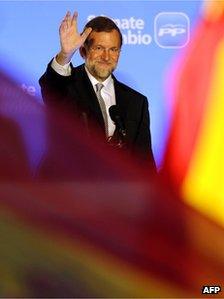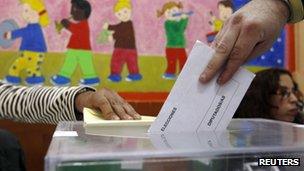Spanish elections: Dangerous days ahead for Rajoy
- Published
- comments

More austerity awaits under Mariano Rajoy
Sometimes, observing election campaigns, I look into the face of a candidate and question how they can possibly want power - knowing the scale of the task that awaits them.
That must apply to Mariano Rajoy, the centre-right Spanish leader who has emerged victorious.
Long years of unemployment, economic stagnation and spending cuts have handed him the reins of power.
From his first day in office, dangerous times will lie ahead.
It is now true that all the heads of government of the so-called PIIGS (Portugal, Ireland, Italy, Greece and Spain) have, one way or another, been swept from power by the euro-zone debt crisis.
'Light on details'
Spain is now in the eye of the storm. In the past week its borrowing costs in the bond market have soared close to 7%, rates that are not sustainable.
The headlines in the papers acknowledge the coming days and weeks are hazardous. "Spain chooses a government to confront the crisis storm," says the El Pais headline.
More austerity is coming. It is widely anticipated. Voters seemed resigned to further cuts in spending on education and health.
But the details of some of the emergency measures have not surfaced during the election.
Sure, Mr Rajoy has promised to introduce "serious" and "profound" austerity measures.

The result of Saturday's election was widely expected
There is talk of de-coupling wages from inflation and of negotiating wages at company rather than sector level. Only pensions - apparently - will remain untouched.
It is said that Mr Rajoy studied the Cameron campaign in the UK and saw the dangers of being too explicit about the cuts to come.
He was accused of running a "valium campaign": so light on detail that it lulled the voters.
The new prime minister knows he cannot be silent for long. He has pleaded with the markets to give him more than half an hour before bringing in their verdict.
Although he does not take power until 20 December, the challenge is to avoid having to go to the EU and the International Monetary Fund (IMF) for a bail-out.
'Outside interference'
The Spanish crisis is daunting. The economy has stalled, with zero growth in the past three months. The country could be heading for a recession. It has the highest unemployment rate in the industrialised world. One in five workers is unemployed.
Nearly 50% of young people are without jobs. Many are finding their voice and anger is growing. The young are heading abroad to the UK, Germany or wherever there is work.
Applications for the Goethe Institute have spiked. Many young people in Spain are learning German.
The new government will try and rein in local government spending. There will be more structural reforms, making it easier to hire and fire and to set up new companies.
But where will the growth come from to bring down the debt? Although the construction bubble has well and truly burst, the fall-out continues.
No-one is quite sure what exposure Spain's regional banks have to housing debt. The banking sector is saddled with 176bn euros ($239bn; £150bn) of bad loans. The pace of evictions is rising.
There are now almost daily battles as protesters - galvanised together by social network sites - fight the bailiffs.
Spain brings more sharply into focus one of the fundamental questions of the crisis.
Is the German medicine of austerity and structural reforms working, or is it locking countries into a spiral of decline?
There is sensitivity to outside interference, with Mr Rajoy saying that European leaders should be elected by their own people, not hand-picked by Brussels or Berlin.
The Irish were outraged this week that their budget was found to be floating around the German Bundestag [parliament] before Irish politicians had got a sight of it.
The European Commission this week is likely to push for even greater monitoring of budgets. Officials will even be able to ask for a new budget draft.
One official is quoted as saying that the "Commission would be of course stepping on the toes of national parliaments and their national sovereignty". It remains to be seen how the voters react to this.
Mr Rajoy said whilst casting his vote that "these years have been tough for Spain". More hardship is promised.
What is less clear is whether the new prime minister can convince the markets to give him time for his reforms, or will he be pushed towards needing a bail-out.